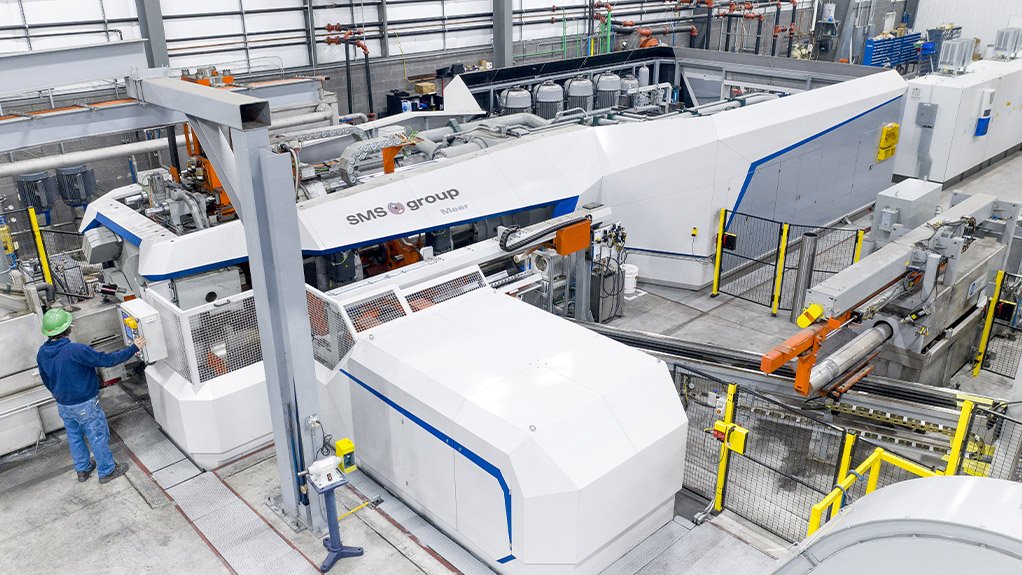With the development of the HybroHeat furnace technology, plant supplier SMS group underlines once again its position as world-market leader for aluminium extrusion plants.
HybroHeat furnace technology combines the advantages of cost-efficient preheating of log material in a gas furnace and precise temperature setting by means of induction technology before extruding the billet. The concept is based on proven technologies from SMS group in which it joins efficient gas furnaces and saws with high-performance induction plants in a single line.
This is one of the many ways that SMS group guarantees extrusion press operators a competent technology partner for complete production lines up to the finished profile.
SMS group supplies extrusion presses with a press force from 10 MN to 160 MN, both as direct or indirect front loader, as well as tube press, or as a combination of all these extrusion methods. Profiles and tubes from aluminium alloys produced on extrusion presses of SMS group are normally used in the automotive, aerospace and construction industries.
The advantages for the extrusion plants are, among others, lower investment and operating costs resulting from a compact design and reduced idle times.
In a HybroHeat furnace, basic log heating takes place in a gas furnace developed on the basis of the high-performance billet furnace HP7. It is characterised by high thermal efficiency of 75% and low average consumption of less than 18 Nm³/t natural gas of log material and it is therefore the market leader in this segment. This can be achieved particularly by a preheating zone where the logs are preheated by means of exhaust air of the combustion zone.
“A preheat zone is provided on the entry side of the direct combustion zone equipped with a burner. The preheating system uses the outlet of the combustion zone, heating up the logs to 200 ºC,” says SMS group division aluminium excursion handling system OMAV MD Massimo Marinelli.
Morover, the fumes pass through a heat exchanger for preheating combustion air which is temperature-controlled and always achieves an optimal air to gas ratio. The thermocouple for measuring the log temperature is designed in such a way that it is mounted at the top of the log and it is air-cooled in standby mode,” explains Marinelli.
The final heating zone is then realised by an induction coil following the combustion zone of the gas furnace almost seamlessly. Before the log is pushed to the fully-electric operated saw arranged in the runout section and cut to extrusion length, a defined temperature profile is set in the induction furnace.
After the cutting process, an electrically driven cylinder pushes the remaining log back to the induction gas furnace, where the end of the log is again heated to extrusion temperature and provided with a taper.
In order to prevent rejects the saw is equipped with a buffer station for temporary reception of the log end, so that the logs can be processed completely – provided the extrusion process allows the extrusion of a two-piece billet.
The entire process is managed by sophisticated software and is executed fully automatically without manual interventions of the operator.
For induction heating, a coil developed by SMS group division IAS is used, reaching an efficiency of up to 70% owing to its multilayered structure and the use of a copper profile particularly matched to the process.
The entire coil length is divided into several zones, depending on the billet length, which can be charged with power ranging from 0 to 100%. This enables a temperature profile setting over the length of the billet and thus creates the conditions for an isothermal extrusion process.
“In each zone, the billet temperature is monitored by means of thermocouple tips and the heating process is controlled by an inverter based on IGBT technology, so that temperature tolerances of less than 3K are achieved,” explains SMS group IAS division sales head Torsten Schäfer.
The same technology is also applied for standalone inductive solutions. By using high power densities, the required extrusion temperature is reached quickly. Apart from a friction-free transport of the billets for optimum surface and thus profile qualities, a high temperature accuracy and process reproducibility, this solution creates a sustainable workplace for customer staff since no carbon emissions arise.
With this development, SMS group underlines its commitment to be a technology partner for the extrusion plants, offering all the required technologies. SMS group – including its IAS GmbH and OMAV S.p.A. divisions – is an international technology leader and has been partners of the extrusion press industry for decades.
With more than 1 700 extrusion presses installed globally, this impressively confirms many years of experience and the expert knowledge of SMS group.






